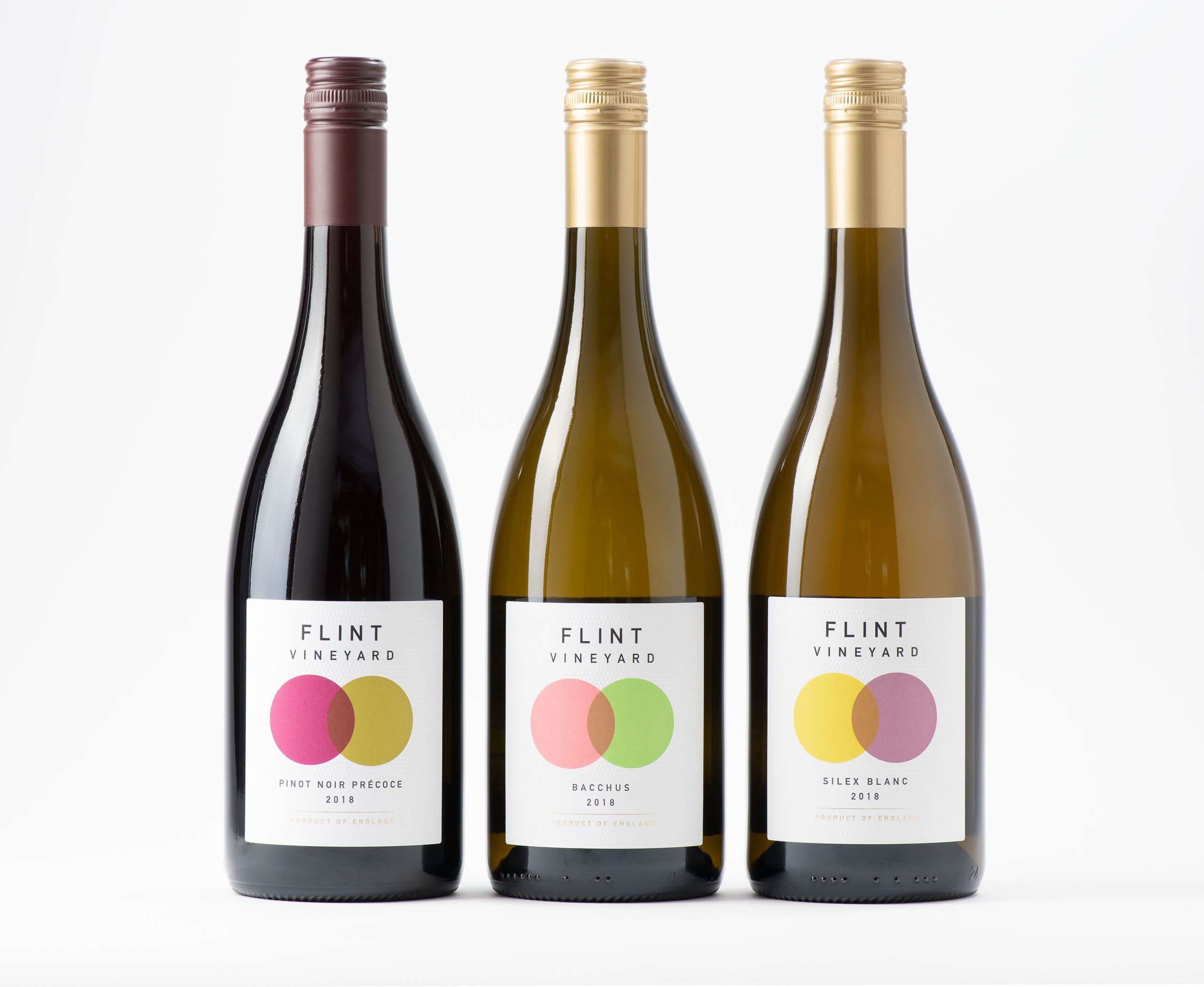
The Norfolk Foodie Series – Flint Vineyard
Flint Vineyard has created a huge stir in the world of wine since they launched in 2016. Run by Hannah and Ben Witchell, this husband and wife team have truly taken the wine scene by storm, winning international awards, becoming regulars in both wine and weekend press, and also stocked by the prestigious wine merchants, Berry Bros & Rudd in London. Flint Vineyard has literally risen from the ground to being a world-class vineyard, and they are a true celebration of the positivity that is the food and drink scene here in Norfolk. I talk with Hannah to get the low down on Flint, how they ended up working in viticulture, and why they love Norfolk so much.
“It still seems too surreal to us that we have achieved all that we have in five years,” says Hannah. “The feedback we have had from respected peers in the wine industry, the local chefs and producers who have supported us so much, to the public who continue to visit us – and have carried on buying wine from us during these past months – has been amazing. We have taken a dream and made it come true.”
Hannah is right, perhaps, to feel overwhelmed when talking at length about all that she and Ben have achieved in Earsham, a small village on the Norfolk/Suffolk border near Bungay. Having spent time travelling, they settled there and founded Flint out of nothing. Now, it has won countless awards and is recognised as one of the most exciting vineyards in English wines. But how did it all begin, and how did they end up on a sandy south-facing slope in south Norfolk?
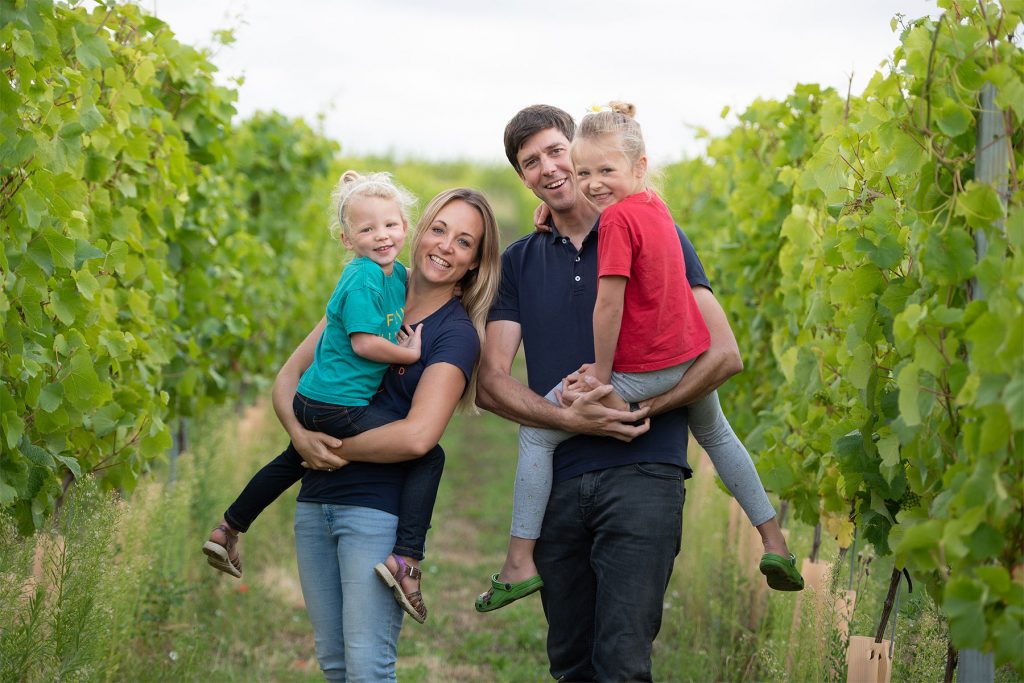
“I am originally from Kent and Ben is from Hertfordshire,” Hannah begins. “We met at Ben’s sister’s wedding – my family were friends of the groom – but we had actually briefly met a few years before during a camping holiday in France.
“My parents retired to Norfolk and both Ben and I have always loved it here. Having done some travelling, we always wanted to settle here, and it just happened that things worked out that way.”
‘Some travelling’ is somewhat of an understatement, as the couple literally travelled the southern hemisphere and just happened to visit some of the main vineyards in each region as they did so. “Ben worked in IT and I was in the travel industry,” recalls Hannah. “In 2007, we decided to rent out our London flat and we set off around the world. While we were both really into wine, that was not the main purpose of the trip. However, we found in South America especially, we could afford to have a steak and a really good bottle of red wine, and we slowly became more interested.”
It was while they were in Argentina that the couple found that they had some extra time. “We were in the Mendoza region and one of the local vineyards, Familia Zuccardi, were looking for volunteers to help with tours. We jumped at the chance and spent four weeks there. They put us up on the vineyard, gave a crash course of the wines, and we worked as English-speaking tour guides. We learned a lot, and that really was the trigger for us as we hoped that we would work in the wine industry one day.”
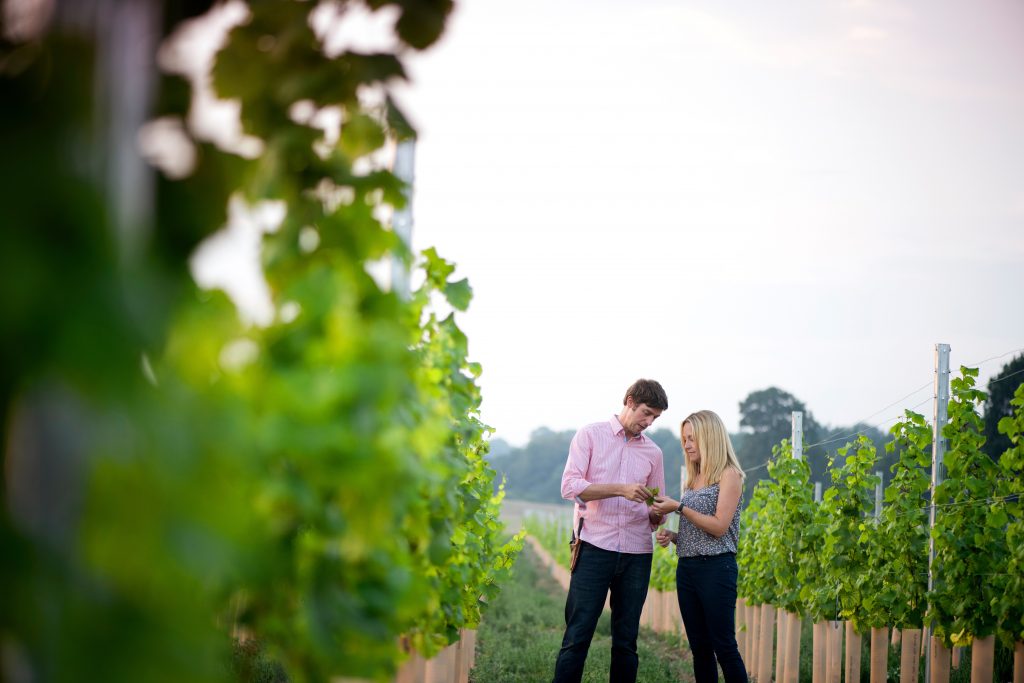
Hannah’s favourite places during this tour were Argentina and New Zealand, although she adds that the couple had an interesting experience travelling in a truck across Africa for eight weeks, camping as they did so.
The following year, they returned to the UK and lived with Hannah’s parents for a couple of months. They wanted to settle in Norfolk then but, with no money following their travels, they knew they needed to go where the work was. Ben got a job at Thames Water, based near Reading, and it was then that viticulture began to raise its head once more.
“When we came back, we knew that we wanted to find out more about wine making,” explains Hannah. “Ben got his WSET qualifications and started doing evening classes at Oxford Brookes University. Then, he went to an open day at Plumpton College in East Sussex, looking at doing another part-time course. However, Ben signed up for a three-year degree in Oenology and Viticulture. He was 35-years old and was the main bread-winner and was giving it all up to become a student once more. I was concerned, but because it was wine, I was sold on the idea!”
Hannah tells me that it was a really tough course, but Ben learned so much alongside the academic content through trips, wine tastings, and work experience at various vineyards both in the UK and abroad. At the end of 2013 Ben graduated, and the couple decided to go to France to work in the Beaujolais region. “I was pregnant with Rosie, our eldest daughter, and Ben took a role as Assistant Wine Maker at Chateau Grange Cochard, which was run by an English couple. I was working for British Airways at the time and went on maternity leave, so it all worked out well.”
The couple spent exactly two years in France, with Hannah teaching English to local children, and during that time, Ben honed the style of wine that he wanted to make. “It was very much a red vineyard, and Ben has always loved the complexity of the different white wines,” says Hannah. “He also prefers the traditional style of winemaking – as later represented in our logo, the Venn diagram, that combines science and tradition.

“I will be honest – we were tempted to stay in France. By the time our two years was up, we knew that we wanted to own our own vineyard. We did look at some there, and got as far as putting an offer in. Land was more expensive as they had old vines, but property was cheap.
“However, we were drawn back to Norfolk once more, not just to be near our families, but because by then, the English wine scene had really taken off. Ben knew that we had more of a chance to make our mark here than in Beaujolais, where there is a vineyard every 300 yards. We didn’t have huge ambitions – we just wanted a small piece of land here in England, where we could plant a few vines and grow them while we had jobs elsewhere. It didn’t quite happen that way though!”
While still in France. Ben spent a long time looking at geological maps and saw that the land here had lots of clay – vines need to be grown on sand, gravel, and flint to thrive – and he identified the Waveney Valley area. “Through my family, we vaguely knew local farmer Adrian Hipwell,” continues Hannah. “We asked him if he knew anyone with a south-facing plot in this small strip that Ben had identified. He answered that he did! He is a tenant farmer, so could not sell us or sub-let the land to us, but after a long talk, we decided that there was potential to go into business together.
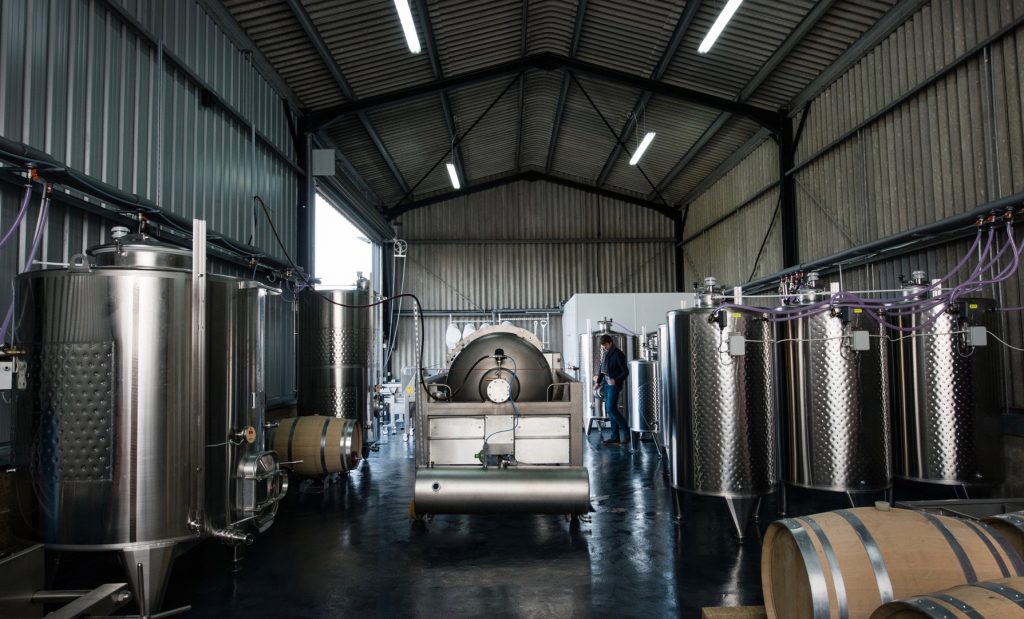
“That was during Christmas 2014 and we were home to visit family and during that time, we visited Earsham. Ben immediately recognised the potential of the slope, and he took soil samples. We kept talking and discussing ideas, and we decided to go ahead in a 50/50 partnership. Adrian had the land, but also farm buildings that could be used and also a house for us to live in. It all fell into place!
“First and foremost, Adrian is a farmer and he had so much practical knowledge that has been invaluable to us. We managed to do a lot ourselves when it came to setting up the vineyard, including putting the trellis up and installing the winery equipment. We couldn’t have done it without him.”
In the summer of 2015, the couple returned to England, with Hannah now pregnant with their youngest daughter, Ella. “That was the year we started setting up Flint Vineyard,” she recalls. “Ben applied for a grant – it took three months alone to complete that! This was the EU Rural Development Programme for England, as the vineyard would bring tourism and jobs to the area. The next step was sourcing equipment, and then in April 2016, we finally planted the vines.”
Having secured the site, the couple were ambitious from the off, knowing that they wanted to make wine that first year in order to help get their name on the map while their own vines grew. “We were keen to source some grape varieties from local vineyards,” explains Hannah. “We got some pinot from Humbleyard Vineyard in Norfolk, and some more grapes from a vineyard in Essex. That meant that we were starting to make wine that very first year.”
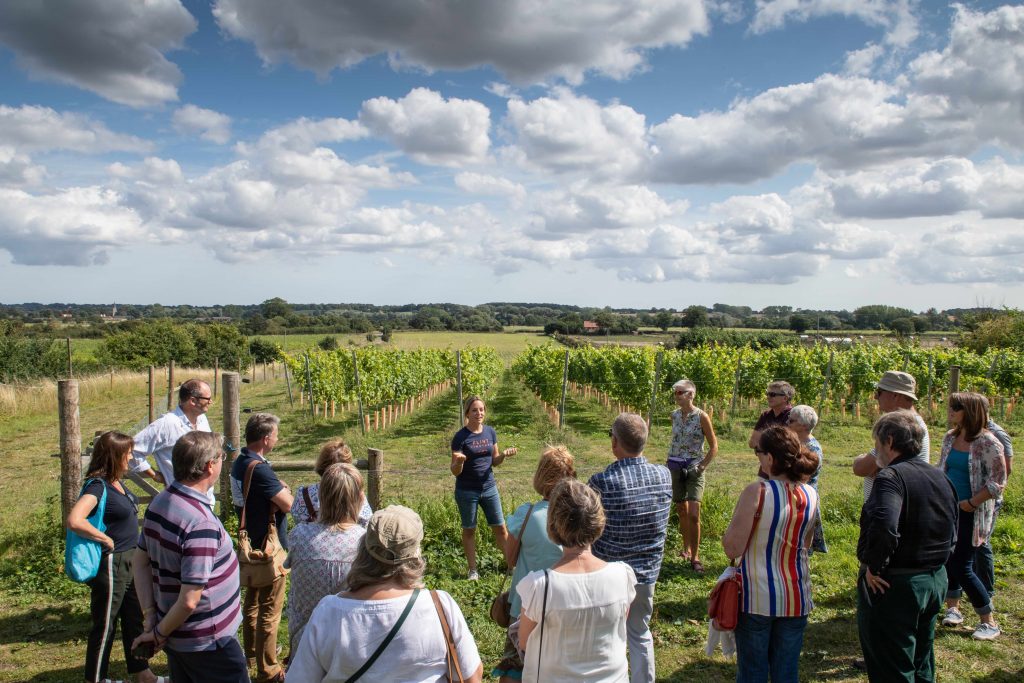
The couple made 8,000 bottles of wine under the Flint Vineyard label that year, and from the off, their aim was to sell directly to the customer as much as possible, and to get visitors to come to the vineyard. “We also approached a couple of high-end restaurants, to see whether they would be interested in adding Flint to their wine lists,” says Hannah. “Benedicts in Norwich were the first to try the wine, and they immediately said yes, which was amazing.”
Also happening in that first year was Flint Vineyard being selected by Berry Bros & Rudd. “We knew the buyer as he had visited the chateau we worked at in France, and we had kept in touch,” smiles Hannah as she recollects this pivotal moment in the business’s early days. “We asked him if he would like to try the wine and he agreed, adding that it wouldn’t be of commercial interest but to send some.
“He tried it and he liked it, so he put it on the desk of the English wine buyer. She tried it two days later, and she really liked it! She knew that it had been open for two days and she was still impressed. She visited the vineyard, and that was that! It was all quite amazing really.”
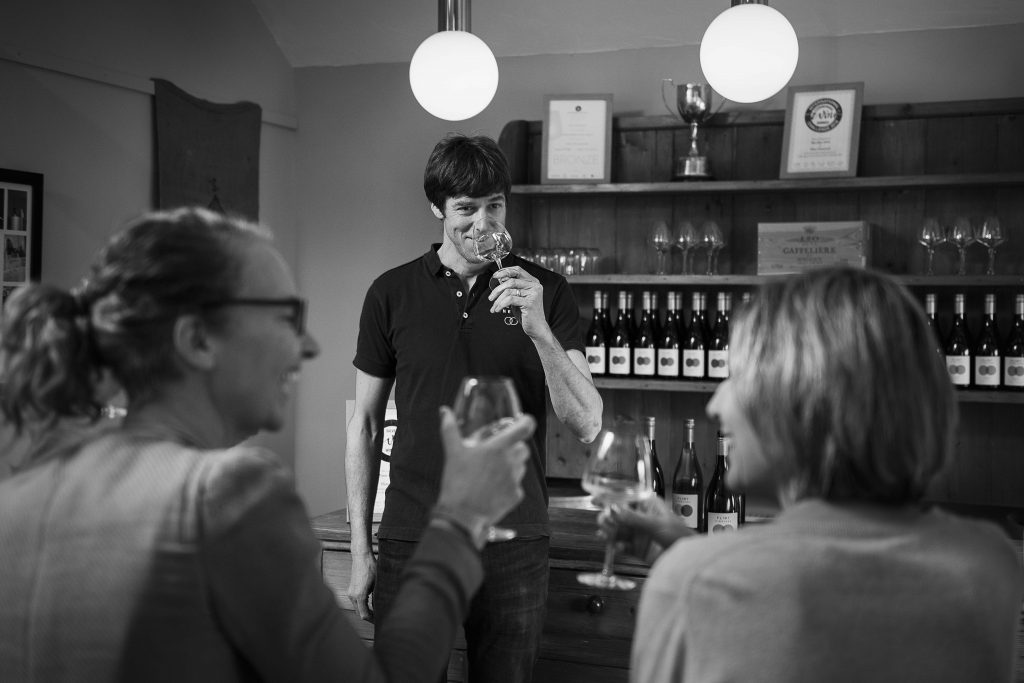
Hannah acknowledges that there was huge momentum in those early days. “The wine aside, there were two real reasons for that,” she explains. “Firstly, Ben had received a grant that enabled him to do a huge research project into the Bacchus grape variety, which is particularly well suited to this region. This really got our name out into the industry and people were keen to try our first wine off the back of that.
“Secondly, we invested hugely on branding and we think that we have a really strong brand. We saw an opportunity with the resurgence in English wines to go with a more modern twist. The Venn diagram is perfect – I love the simplicity of it, and also how adaptable it is.
“Before we even produced our first wines, we set up the Venn Club and members receive wines not for sale to the general public. It is great for Ben as he can experiment with the wines and perhaps produce something that is not as commercial, while also creating something very special.
“The labels on these wines are individually designed, and last year we were struggling for a label to go with the first single estate wine, made exclusively from our own grapes. We left some proofing labels on our kitchen table and Ella, our youngest daughter who was three at the time, scribbled on it and coloured it in. We decided that it was perfect, and we used it for our 2018 label. This year, one of our 2019 Venn Club wines has a label designed by Rosie. And for 2020, we are going to open it up to Venn Club members, which I think will be great fun. We are hugely grateful to our Venn Club members for all their support, and so many of them have been with us from the start.”
It is that individual touch, as well as an ability not to take themselves too seriously, that has endeared Flint Vineyard to so many. They remain resolutely down to earth, and in spite of that momentum in the early days, their journey has not always been an easy one. Hannah freely acknowledges that there have been a lot of doubts the whole way through, not least due to the huge upfront investment in setting up the vineyard and winery.
“Neither of us have run our own business before, so there has been a huge learning curve,” says Hannah. “We have two young children and have put everything into Flint Vineyard – financially and emotionally. There is always the worry – will people like our wine? Will they come on our tours? I don’t think that ever goes away.
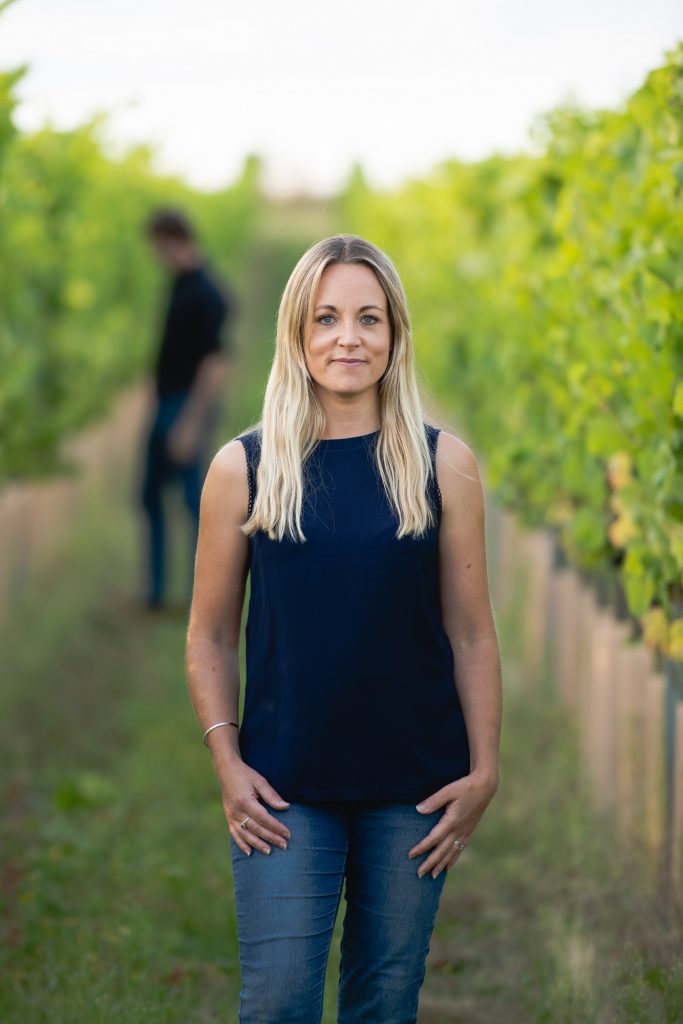
“This is the time of year that it all takes off for us, but COVID-19 has impacted hugely. Traditionally, we have two Saturday tours, every week, between April and September, as well as private events and a special launch of the new vintage. We have lost all our cellar door trade as well as trade with restaurants and distributors. Then there are all the food and drink festivals and events such as the Royal Norfolk Show. We haven’t been able to do any of that, and that has been a huge concern. Thankfully, our online sales have increased significantly, and we are so grateful for that. We deliberately reduced our free delivery threshold to £25 and people have really taken advantage of that.
“This pandemic aside, we are really pleased with how Flint Vineyard has developed and just how well the wines have been received. We have been told by others that our dream has come true and that we have inspired others, which is lovely to hear.”
Hannah and Ben’s dreams certainly have come true. Their very first Bacchus earned them the award of East Anglian Wine of the Year. “That knocked us for six!” laughs Hannah. “It was a huge testament to Ben’s belief in his wine making. We released our first vintage at the 2017 Beccles Food and Drink Festival in May and had sold out of that Bacchus by the end of the summer. We knew we had to make more wine. We doubled our production each year until we did 30,000 bottles last year and we kept it the same for the 2019 vintage. Everything is done by hand and all the grapes are picked by hand.”

Another moment that stands out for Hannah was when wine expert Olly Smith – frequently seen on Saturday Kitchen – reviewed the wines, and the day that we speak, Oz Clarke sent the couple his guide to English wines, including a whole section on Flint Vineyard. “It feels really unreal when somebody big in the wine world likes your wine and really rates it,” says Hannah. “There have been a few big moments. Jamie Goode of The Wine Anorak writes wine science books and Ben really wanted him to taste the wines. Jamie has reviewed our wines twice now, and that means a lot to Ben.
“Then there was the amazing moment when wine writer Matthew Jukes described our Charmat Rosé as a ‘stunner’, saying that it was the best example of Charmat he had tasted anywhere in the world. That was an incredible moment for us, and he even rang Ben for a chat about the wines, which was special. We thought that the land the vines were on was more suited to still wines, but Ben thought we could try a Charmat, which is the method where the wine’s secondary fermentation takes place in a tank rather than in a bottle. No one else had tried it at that time, and we couldn’t have predicted how popular it would be. It fills the gap between prosecco and champagne, and it appeals to a wide range of people. It remains our best seller, along with our Bacchus.
“The ultimate highlight has to be when Berry Bros officially launched us as an ‘agency’ – when our wine is sold exclusively through them. This was in September 2018, and we were the first English still wine on their list, and it was a huge honour. We, and a handful of others, were launched at a special event in the cellars of their London store at St James Street. All the sales teams were there to taste the wines and to meet us. That evening, they hosted a private dinner for 10 of us and it felt so surreal that we were there, mixing with these amazing people. The whole day seemed like a big dream, and we will always look back on it and smile.”
While there is clearly plenty to smile about, the couple also like to make other people smile and one of the ideas that they brought back from the Beaujolais region does just that – their monthly Camphill Fridays. “Summers in France were spent in the vineyards with live music playing, local wine being served, and local producers there with food to buy. It was so convivial, and it brought everyone together. We really wanted to do that here at Flint. We have the Ampersand Brewery on the same site as the vineyard, so it made perfect sense.
“We never imagined that it would become as big as it has, however! The first year, we had 100-200 people each month, but last year it was more like 400-500. It was amazingly popular – with free entry, people just turned up and bought wine and beer, and hot food. It was very family friendly, and people loved it. This, too, has been hit by COVID-19 and we have decided not to hold any Camphill nights this year. We need to think about how to continue to make it enjoyable for everyone, given the number of people turning up.”
One element of the Camphill nights that has caught many people by surprise is the band. Live music is a huge element of these evenings, and typically it is the Yield Band who play – with Ben as lead vocals and guitar. “Ben has always been in bands,” laughs Hannah. “The rest of the group is made up of the amazing photographer Simon Buck, who plays the drums, and Matt Haddingham, a local farmer who plays bass guitar and also sings vocals. The only problem with Yield performing at one of our evenings is that if Ben is on stage, he cannot be helping me with the bar!”
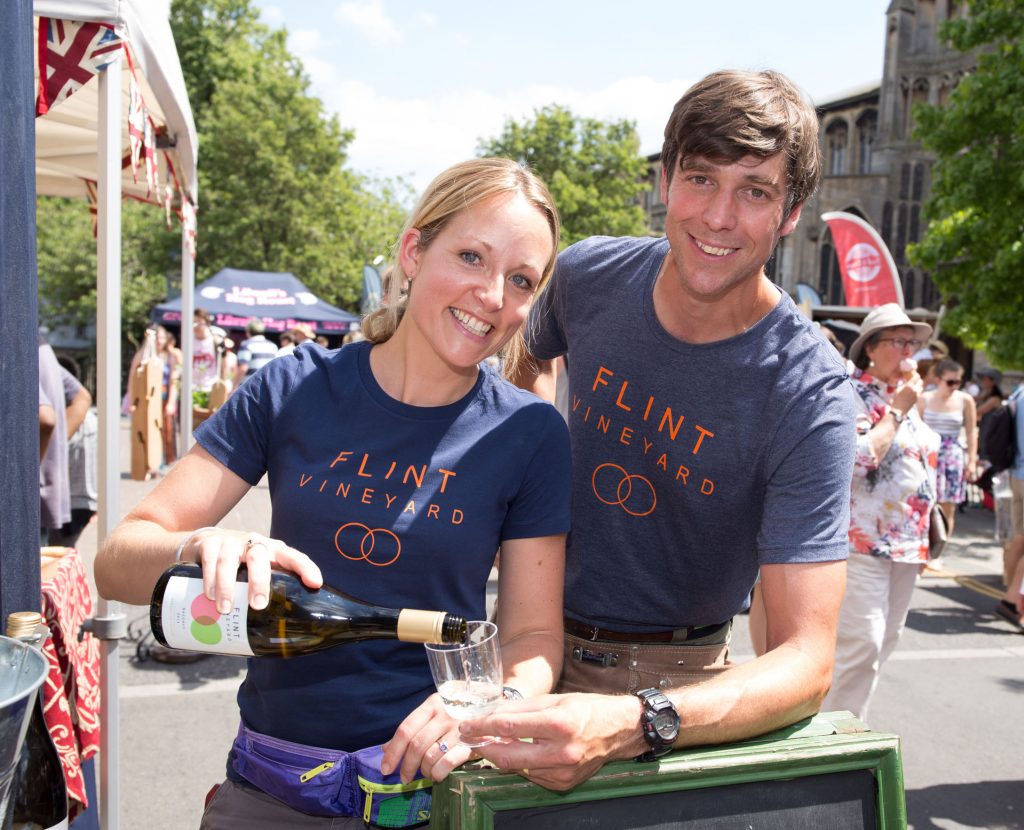
This is a perfect point to ask Hannah just how difficult it has been, being husband and wife with two young daughters, setting up a business together, and working together every day. “It has been really hard,” she acknowledges. “You can never switch off, so there is little down time from the vineyard, and that makes me feel guilty for Rosie and Ella. They are older now and are more independent, but it was hard when they were babies. I cannot imagine doing anything else though, and I am so proud of what we have achieved. Sometimes, I think that we need to celebrate our achievements a bit more, as well as having more days out together as a family.”
Being part of the resurgence of English wines means a lot to Ben and Hannah. “We have won silver medals at international wine awards,” explains Hannah. “When you think about English wines being judged against the rest of the world, it is amazing.
“We are very lucky here. There is a band, an area from Essex that goes up through Suffolk and into Norfolk. It has the perfect conditions for growing wine, and Ben identified this area when we looked to settle back in the UK. We have amazing weather here and the climate is perfect, including low rainfall, dry and long sunny days.
“I think that Norfolk is the next hot spot for English wine, and while we may have been in the right place at the right time, Ben knew its potential. There are so many established vineyards here in Norfolk already and it all helps to raise the profile of Norfolk wine. John and Bridget Hemmant from Chet and Waveney Valley Vineyard were especially welcoming, inviting us over for lunch and to see their vineyard when we first started. And of course, some of our first grapes came from Humbleyard Vineyard.”
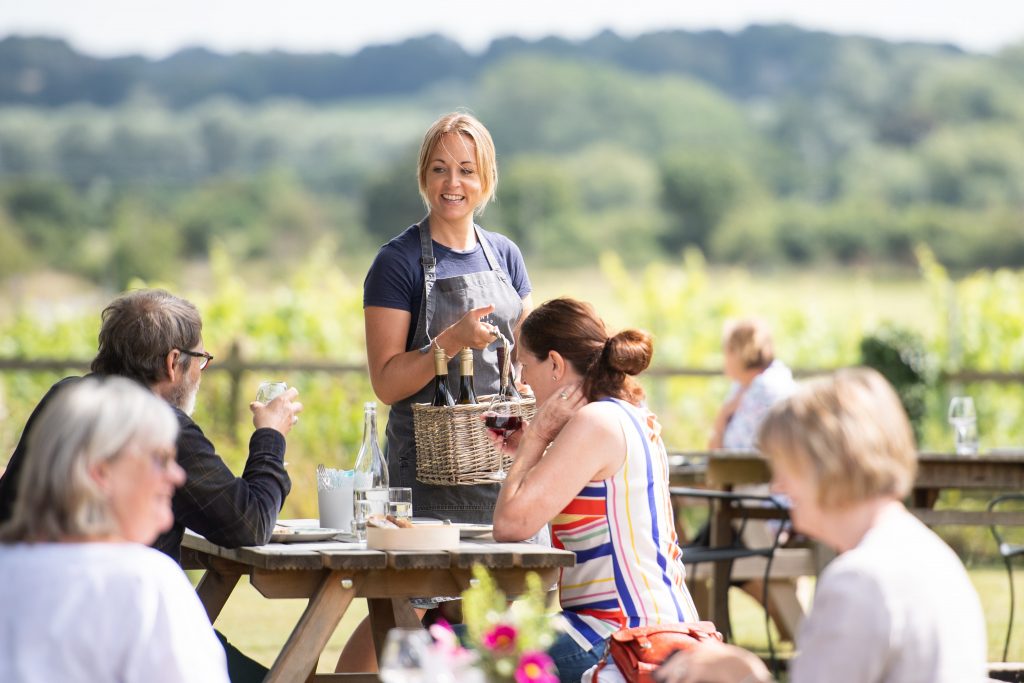
Hannah and Ben celebrate Norfolk produce through their 15-mile lunch, that goes with the weekend tours. “To be involved in the Norfolk food and drink industry, you have to have a good product,” she says. “The standard here is so high, and we wanted to celebrate that through food as well as wine. We knew we wanted people to stay at Flint longer than just the tour so initially, we thought we would offer a cheeseboard with the wine and would use the local Fen Farm’s Baron Bigod and the St Jude. We then decided to add charcuterie, and the nearest is Marsh Pig 13 miles away. We get our bread from Hempnall Village Bakery and it was perfect. Then Jane Stewart from Eastgate Larder visited, and she suggested a local medlar jelly to go with the lunch, sourcing them from Pulham St Mary. It is perfect, and they all match so well with our wines as well as promoting the great produce that we have here.
“As a whole, the producers in Norfolk are amazing, as is the food and drink community as a whole. We received so much advice in the early days, and so many businesses recommend others, which is lovely to see. Proudly Norfolk have helped as well, including great advice and directives during COVID-19. As a whole, the Norfolk foodie community is so collaborative and welcoming, and we now try to pass on advice in the same way that we received it when we began.”
While Hannah and Ben may not be from Norfolk, they have a deep love for the county. “The people here are so friendly,” smiles Hannah. “I am from Kent, and I find everyone here so welcoming and friendly, even to strangers. It is lovely. Then there is the scenery. We love to go to the coast, especially in north Norfolk. It is a lovely place for children to grow up, and we are so fortunate as you can be at the coast within 30 minutes. Norfolk has so much space. As a whole, I think that Norfolk is a little bit undiscovered really, it is a hidden gem, and that is part of its appeal.”
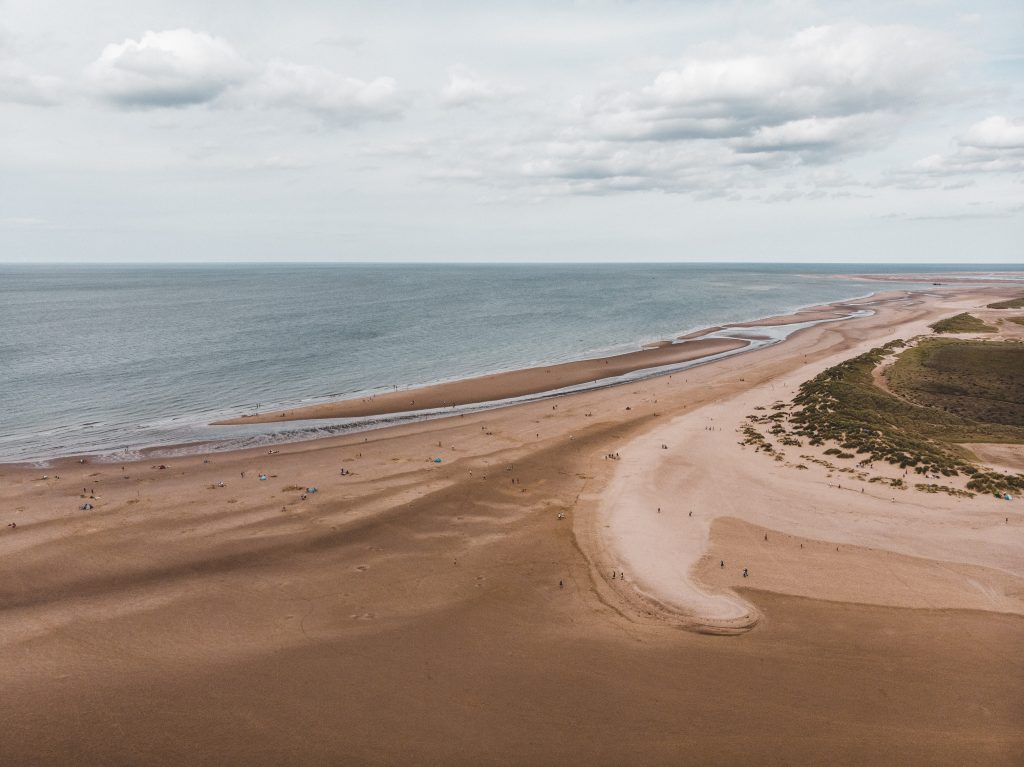
I ask Hannah where her favourite place to eat is, and she takes a while to answer. “I have had so many amazing and special meals here in Norfolk that it is hard to choose just one place,” she says. I press her for an answer. “Socius. I think that they are doing amazing things, and we had an incredible meal there last year that stands out for many reasons.
“As for beach, definitely Holkham. I love the walk through the forest to get there. We often camp with the children in north Norfolk in the summer, and that is always special. A pub would be The Dun Cow at Salthouse, where we went unexpectedly during a walk and had amazing lobster and chips. It looks out over the salt marshes, and it was just perfect. And a place? Norwich. I love going there! It is an amazing city, with so many different cafés and restaurants, as well as the market.
“I think this is an exciting time for Norfolk as it feels as though there are a lot of places opening of outstanding quality, and customers are spoiled for choice. This is great to see, and I think we all cannot wait for normality to return so that we can start to enjoy these places again.”
I ask Hannah their preferred way to enjoy their wines and she laughs. “Most of the wine we drink is leftover from tastings, and we have it with whatever is in the fridge that day! It is a real treat when we go to a restaurant and they pair their food with our wines. We have had some amazing creations, and we are always happily surprised with what chefs do.”
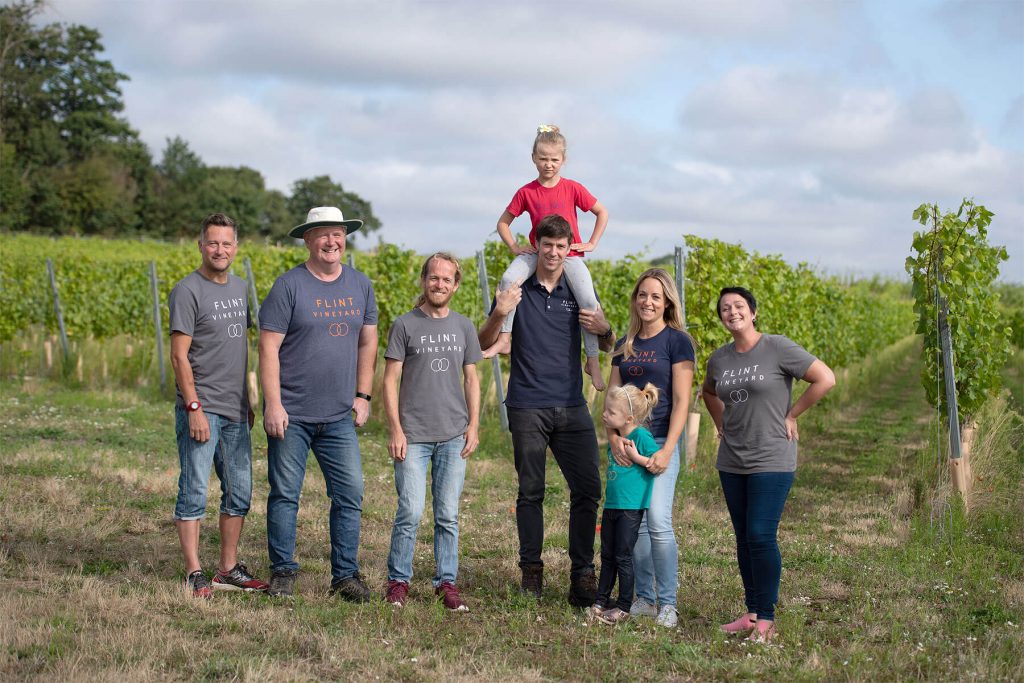
Finally, it is time to ask Hannah to sum up Flint Vineyard in one sentence. She says:
“One of the UK’s most exciting new wineries.”
Our conversation comes to an end and it is clear that, like any business, we only get to see the glamourous side of wine tastings and relaxed evenings in a vineyard. The amount of hard work and sheer belief in what they were doing and that Hannah and Ben have put into Flint Vineyard is astounding – to have reached such a level in such a relatively short time – and you just know that there is a lot more yet to come. Had their travel plans not taken them past that Mendoza vineyard all those years ago, we may now not have Flint Vineyard at all, and that would be a real shame indeed.
Further reading
Flint Vineyard
Yield Band
